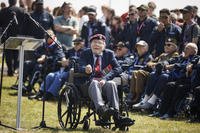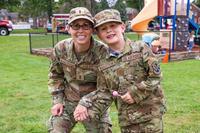Joyce Raezer is executive director of the National Military Family Association; Steve Schwab is CEO of the Elizabeth Dole Foundation; and retired Lt. Gen. Mike Linnington is CEO of the Wounded Warrior Project.
Zianni is the middle child in a family of five. Before and after school, she takes care of her younger siblings and helps her mom make dinner. But her most important role is keeping her siblings calm so they don't add more stress to an already fragile environment.
Fifteen years in the Army and three tours in Iraq left Zianni's dad with post-traumatic stress disorder (PTSD), anxiety attacks and physical injuries. The family dynamic is centered around his care, and Zianni is often lost in the mix.
Since September 11, 2001, nearly 7,000 American troops have died in combat zones and nearly 53,000 have sustained injuries in combat that qualified them to receive the Purple Heart medal. More than 380,000 have sustained traumatic brain injuries.
While the many challenges facing wounded veterans have been well documented over the past two decades of war, less has been written about the impact of war on the service members' families -- especially their children.
There are dramatic changes in family roles and responsibilities post-injury. The spouse often becomes a caregiver and, without anyone even noticing, so does the child. There are thousands of hidden helpers like Zianni, forced to grow up and take on the weight of their wounded parents' care and all that comes along with it.
As the leaders of the Elizabeth Dole Foundation, the National Military Family Association and Wounded Warrior Project, we are proud to initiate a new national effort to address the needs of the children of injured veterans and military caregivers. In July 2018, we convened support organizations, subject-matter experts and caregivers for an Impact Forum examining the Children of Military Caregivers. On the tails of this event, we have joined forces to create a shared action plan to address the needs and gaps in support of this underserved population.
Our recently released report, outlining learnings from the forum, found that children of injured veterans often experience mental and physical health challenges that adversely impact their quality of life. Often, the trauma experienced by the injured veteran is passed onto their children in the forms of uncertainty-related anxiety and fear.
Academic experts noted that these children present higher rates of behavioral health challenges, due in part to the increased demands on the adults in the household to provide care for the injured veteran, often impacting the time they have to parent their children.
Children of military caregivers also present higher risks of social isolation. A Department of Veterans Affairs Caregiver Program study revealed that 75 percent of caregiver respondents engaged in their communities, on average, only three times (or less) per month. When a parent is also a caregiver, the time demands of caregiving often restrict military children's abilities to engage in school and extracurricular activities.
Furthermore, many caregivers report that the public's lack of understanding of caregiving responsibilities on children of wounded warriors often compounds the negative impacts of social isolation and can promote labeling of children of wounded warriors as "problem" children.
The families of injured veterans also face increased financial pressures as the unemployment rate for military caregivers overall is approximately 10% -- nearly three times as high as the national average of 3.8 percent -- and the families are met with unreimbursed health care-related expenses. Many caregivers are forced to quit their jobs to meet the needs of their injured veteran.
Supporting children of military caregivers, our nation's hidden helpers, is an endeavor that will span decades. Through our partnership, we have identified a few initial recommended action steps we need to take to adequately address the needs of our caregiver children.
First, more research is needed to find ways to lessen the impact on children of military caregivers and increase their personal development and opportunities. We're embarking on a large-scale quantitative study, which will assess the impact of caregiving on children's physical and mental health and school performance to provide insight into the challenges they face and inform methods to meet their needs.
Second, more needs to be done to increase children's access to affordable and timely mental health care. Non-traditional options such as parenting and preventative programs should be considered to help caregivers and their children deal with normal reactions to extreme and protracted stress, anxiety and overwhelming responsibilities.
Third, a national effort is required to help reduce the stigma and social isolation experienced by caregivers' children through increased community engagement and public education, especially within schools.
To read the full-length Children of Military Caregivers Impact Forum report, visit https://www.elizabethdolefoundation.org/impact-forum/. And to learn more about how to help, visit www.elizabethdolefoundation.org, www.militaryfamily.org and https://www.woundedwarriorproject.org/.
-- The opinions expressed in this op-ed are those of the author and do not necessarily reflect the views of Military.com. If you would like to submit your own commentary, please send your article to opinions@military.com for consideration.












